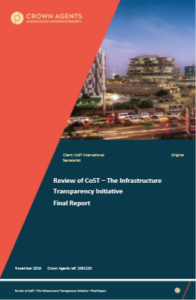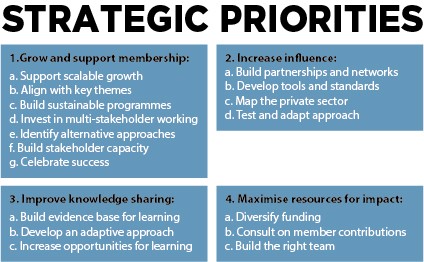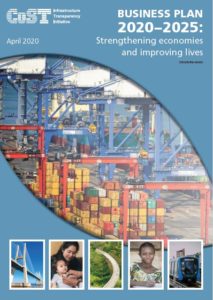Today CoST launches the consultative version of its new Business Plan 2020−2025 ‘Strengthening economies and improving lives’. CoST Executive Director, Petter Matthews, reflects on the process of its development and the extraordinary circumstances surrounding its publication.
The process of developing a business plan usually begins with reflection on progress against previous plans and by drawing on lessons from recent experience. It then examines the external environment to help look forward and formulate strategic objectives. In developing our new business plan, the process of reflecting on the past was aided by an external review undertaken by Crown Agents. It examined progress over the previous period and provided a series of thought-provoking recommendations. When it came to looking forward however, the planning process was overshadowed early in the new year by the coronavirus pandemic and the start of what is now a global recession. The questions confronting us at that point were: Is it a case of rip it up and start again? Or a case of making tactical adjustments?
External review
 The external review of CoST was thorough, involving a desk-based study of documentation, interviews, a survey and detailed examinations of four members, Afghanistan, Ethiopia, Honduras and Uganda. The findings were positive about progress, identifying impressive examples of impact and concluding that even more could have been achieved had additional resources been available. And it was particularly gratifying for the global CoST Secretariat team to learn that members reported high levels of satisfaction regarding the support they receive.
The external review of CoST was thorough, involving a desk-based study of documentation, interviews, a survey and detailed examinations of four members, Afghanistan, Ethiopia, Honduras and Uganda. The findings were positive about progress, identifying impressive examples of impact and concluding that even more could have been achieved had additional resources been available. And it was particularly gratifying for the global CoST Secretariat team to learn that members reported high levels of satisfaction regarding the support they receive.
The review also identified areas where progress had been slower than expected and where persistent challenges had been encountered. For example, the authors drew attention to members in Africa where ‘progress has been patchy’ and the volume of data disclosed in relative terms limited. They also pointed out that more should be done with the findings of assurance reports, to ensure that governments address any weaknesses and ensure that ultimately, the process leads to systemic change. These findings came under scrutiny by the CoST Board, who were determined to address them in the new business plan.
4 strategic priorities to deliver a step change in impact
The plan is structured around four strategic priorities. These were identified during a workshop involving the CoST Secretariat and key advisers. They reflected on the independent review and tested its recommendations against the practical experience gained since CoST was launched in 2012 and from working across 21 countries.
 The workshop also considered how we should respond to pressing issues such as climate change, gender and social inclusion. Opinions differed on these broader issues. Some felt they should be integrated into all areas of activity, whilst others recognised their importance, but cautioned against possible dilution of the charitable objectives that CoST was established to address. A compromise eventually emerged in that our core objectives remain the basis of establishing priorities, but that the nature of our work provides us with opportunities to positively address these important issues.
The workshop also considered how we should respond to pressing issues such as climate change, gender and social inclusion. Opinions differed on these broader issues. Some felt they should be integrated into all areas of activity, whilst others recognised their importance, but cautioned against possible dilution of the charitable objectives that CoST was established to address. A compromise eventually emerged in that our core objectives remain the basis of establishing priorities, but that the nature of our work provides us with opportunities to positively address these important issues.
Responding to the pandemic – a change in strategy or tactics?
The far-reaching impact of the pandemic and the global recession, which is now an inevitable consequence, only became apparent when the business plan was substantially complete. We considered rewriting sections to reflect these new realities, but eventually decided against it for two reasons.
First, it is not easy to anticipate what the long-term implications of the current crisis will be. Some things are apparent, for example the urgent need for investment in public health in many parts of the world and that a far greater emphasis on resilience is required to better respond to future crises. But questions regarding the international financial architecture of infrastructure investment and how public demands might shift as a result of recent experience, are still uncertain.
Second, at this stage, it appears that our responses to the crisis are more likely to be tactical than strategic What this means in practice is that our strategic priorities are unlikely to change significantly. CoST was established to address fundamental challenges regarding the lack of transparency and accountability in infrastructure investment. Those challenges remain and if anything, have taken on greater urgency as a result of the crisis.
What is more likely to change is the tactics we adopt to pursue those objectives. For example, could there be requests for new types of types of data to be disclosed, on how resilience has been incorporated into the design and operation of new infrastructure assets? Or could there be an increased emphasis on disclosing data on service provision, so that the public is informed about how infrastructure assets are being managed and maintained in real time? Our responsibility is to be flexible and agile in our response to new demands and those characteristics are built into the new plan.
Informed by the past, focused on the future
 Developing the plan during a crisis had the unforeseen consequence of forcing us to take nothing for granted. It made us question underlying assumptions and think critically about the relationship between transparency, accountability and participation on the one hand and crises and resilience on the other. We concluded that CoST will remain extremely relevant in a post-pandemic world and that the major challenges we face relate to scaling-up the programme and responding to demand.
Developing the plan during a crisis had the unforeseen consequence of forcing us to take nothing for granted. It made us question underlying assumptions and think critically about the relationship between transparency, accountability and participation on the one hand and crises and resilience on the other. We concluded that CoST will remain extremely relevant in a post-pandemic world and that the major challenges we face relate to scaling-up the programme and responding to demand.
CoST has supported the disclosure of data on tens of thousands on investments and helped save hundreds of millions of dollars. We have provided the evidence that has closed corrupt institutions and triggered fundamental institutional reforms. And as our new business plan demonstrates, we are ready to play our part in making transparency, accountability and participation an integral component of all infrastructure investment. It is our profound hope that this will help build resilience and reduce the impact of future crises on people, planet and economies.
Have your say
The process of developing the plan, as described above, has involved a considerable investment of time and effort. However, we are not assuming that it can’t be improved and so we are making it available for consultation. Over the next month we invite you to contribute to key questions on the plan and its strategic priorities.
Useful Links
CoST Business Plan 2020 – 2025: Strengthening economies and improving lives
